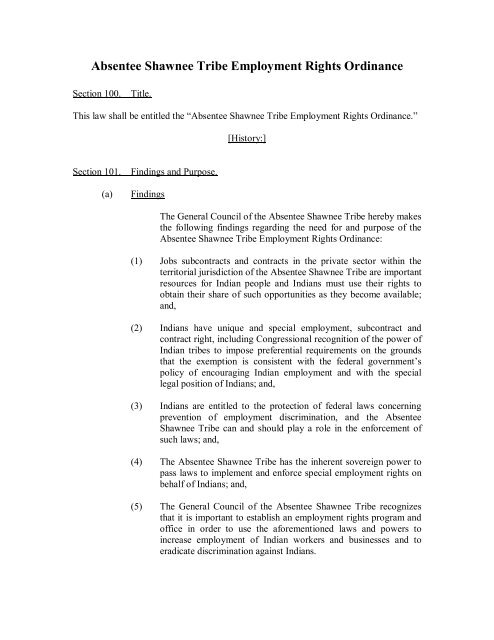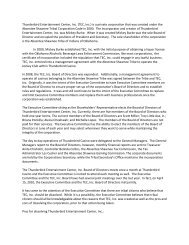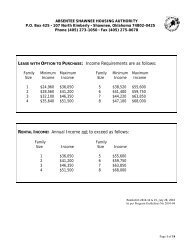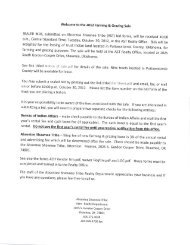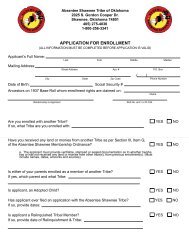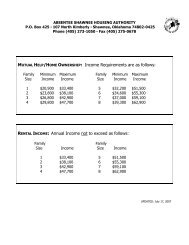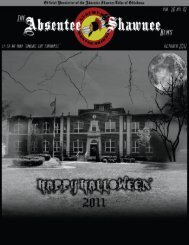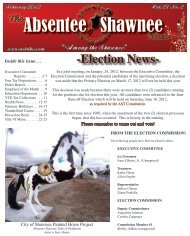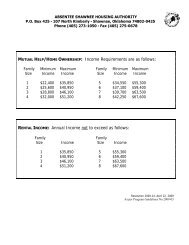Absentee Shawnee Tribe Employment Rights Ordinance
Absentee Shawnee Tribe Employment Rights Ordinance
Absentee Shawnee Tribe Employment Rights Ordinance
Create successful ePaper yourself
Turn your PDF publications into a flip-book with our unique Google optimized e-Paper software.
<strong>Absentee</strong> <strong>Shawnee</strong> <strong>Tribe</strong> <strong>Employment</strong> <strong>Rights</strong> <strong>Ordinance</strong>Section 100. Title.This law shall be entitled the “<strong>Absentee</strong> <strong>Shawnee</strong> <strong>Tribe</strong> <strong>Employment</strong> <strong>Rights</strong> <strong>Ordinance</strong>.”[History:]Section 101. Findings and Purpose.(a)FindingsThe General Council of the <strong>Absentee</strong> <strong>Shawnee</strong> <strong>Tribe</strong> hereby makesthe following findings regarding the need for and purpose of the<strong>Absentee</strong> <strong>Shawnee</strong> <strong>Tribe</strong> <strong>Employment</strong> <strong>Rights</strong> <strong>Ordinance</strong>:(1) Jobs subcontracts and contracts in the private sector within theterritorial jurisdiction of the <strong>Absentee</strong> <strong>Shawnee</strong> <strong>Tribe</strong> are importantresources for Indian people and Indians must use their rights toobtain their share of such opportunities as they become available;and,(2) Indians have unique and special employment, subcontract andcontract right, including Congressional recognition of the power ofIndian tribes to impose preferential requirements on the groundsthat the exemption is consistent with the federal government’spolicy of encouraging Indian employment and with the speciallegal position of Indians; and,(3) Indians are entitled to the protection of federal laws concerningprevention of employment discrimination, and the <strong>Absentee</strong><strong>Shawnee</strong> <strong>Tribe</strong> can and should play a role in the enforcement ofsuch laws; and,(4) The <strong>Absentee</strong> <strong>Shawnee</strong> <strong>Tribe</strong> has the inherent sovereign power topass laws to implement and enforce special employment rights onbehalf of Indians; and,(5) The General Council of the <strong>Absentee</strong> <strong>Shawnee</strong> <strong>Tribe</strong> recognizesthat it is important to establish an employment rights program andoffice in order to use the aforementioned laws and powers toincrease employment of Indian workers and businesses and toeradicate discrimination against Indians.
(b)Purpose(1) The purpose of the <strong>Absentee</strong> <strong>Shawnee</strong> <strong>Tribe</strong> <strong>Employment</strong> <strong>Rights</strong> t<strong>Ordinance</strong> is to assist in and require the fair employment of Indiansto create employment and training opportunities for citizens of the<strong>Absentee</strong> <strong>Shawnee</strong> <strong>Tribe</strong> and other Indians, and to preventdiscrimination against Indians in the employment practices ofemployers, who are doing business within the territorialjurisdiction of the <strong>Absentee</strong> <strong>Shawnee</strong> <strong>Tribe</strong> of Oklahoma.[History:]Section 102. Definitions.Terms contained in the <strong>Absentee</strong> <strong>Shawnee</strong> <strong>Tribe</strong> <strong>Employment</strong> <strong>Rights</strong> <strong>Ordinance</strong> shall bedefined as follows:(a)(b)(c)(d)(e)(f)(g)“Commerce” shall include all trade, traffic, distribution, communication,and transportation, provision of services, manufacturing, production,agricultural production, building, maintenance, construction, banking,mining and energy production.“Commission” as used in this <strong>Ordinance</strong> shall mean the <strong>Absentee</strong><strong>Shawnee</strong> <strong>Tribe</strong> <strong>Employment</strong> <strong>Rights</strong> Commission.“Director” as used in this <strong>Ordinance</strong> means the Director of the <strong>Absentee</strong><strong>Shawnee</strong> <strong>Tribe</strong> <strong>Employment</strong> <strong>Rights</strong> Office.“EEOC” shall mean the Equal <strong>Employment</strong> Opportunity Commission ofthe United States.“Employee” shall mean any employee, any applicant for employment, andany former employee whose employment has ceased as a consequence ofor in connection with a current labor dispute or because of an unfair laborpractice. The “employee” shall not include any individual employed inthe domestic services of any family or person at his home, or anyindividual employed by any other person who is not an employer as hereindefined.“Employer” shall mean any person, partnership, Corporation or otherentity that employs, for wages, two or more employees.“Tribal <strong>Employment</strong> <strong>Rights</strong> Office” shall mean the <strong>Absentee</strong> <strong>Shawnee</strong><strong>Tribe</strong> <strong>Employment</strong> <strong>Rights</strong> Office as established on the <strong>Absentee</strong> <strong>Shawnee</strong>Tribal <strong>Employment</strong> <strong>Rights</strong> <strong>Ordinance</strong>.
(h)(i)(j)(k)(l)(m)(n)(o)(p)(q)(r)“Entity” means any person, partnership, corporation, joint venture,government, governmental enterprise, or any other natural or artificialperson or organization. The term “entity” is intended to be as broad andencompassing as possible to ensure applicability of the <strong>Absentee</strong> <strong>Shawnee</strong><strong>Tribe</strong> <strong>Employment</strong>s Right <strong>Ordinance</strong> herein to all employment andcontract activities within the <strong>Tribe</strong>s jurisdiction and the term shall be sointerpreted by the Commission and the Courts.“Government Commercial Enterprise” means any activity by the <strong>Absentee</strong><strong>Shawnee</strong> <strong>Tribe</strong> or of the state government that is not a traditionalgovernment function as defined by the Internal Revenue Service.“Immediate family” means brother, sister, son, daughter, mother, father,husband, wife, stepbrother, stepsister, halfbrother, halfsister, or brother,sister, son , daughter, mother or father by adoption.“Indian” means any enrolled citizen of a federally recognized Indian tribe.“Indian owned firm or entity” means any commercial, industrial or otherbusiness which is owned by an Indian or other Indian owned firm orentity, provided that such Indian ownership constitutes not less than fiftyonepercent (51%) of the enterprise.“Resident Indian” shall mean any enrolled citizen of a federallyrecognizedtribe who resides within the territorial jurisdiction of the<strong>Absentee</strong> <strong>Shawnee</strong> <strong>Tribe</strong> not less than sixty (60) days preceding the initialdate any contract for work on land within the territorial jurisdiction of the<strong>Tribe</strong> is let or the initial date any employment offers are made by anemployer permanently located on lands within the territorial jurisdiction ofthe <strong>Absentee</strong> <strong>Shawnee</strong> <strong>Tribe</strong>.“<strong>Tribe</strong>” means the <strong>Absentee</strong> <strong>Shawnee</strong> <strong>Tribe</strong> of Indians of Oklahoma.“<strong>Absentee</strong> <strong>Shawnee</strong> <strong>Tribe</strong> District Court” means the District Court asdefined in Title Courts, §2(d) of the Code of Laws of the <strong>Absentee</strong><strong>Shawnee</strong> <strong>Tribe</strong> of Indians of OK.“<strong>Absentee</strong> <strong>Shawnee</strong> Tribal Police” means the Police defined in the PoliceDepartment Standard Operating Procedures Manual of the <strong>Absentee</strong><strong>Shawnee</strong> <strong>Tribe</strong> of Indians of Oklahoma.“Nonresident Indian” means any Indian who is not a resident Indian asdefined by §102 (m) herein.“AST TERO” means the <strong>Absentee</strong> <strong>Shawnee</strong> <strong>Tribe</strong> Tribal <strong>Employment</strong><strong>Rights</strong> Office.
(s)(t)(u)“Territorial jurisdiction” means the property held in trust by the UnitedStates of America on behalf of <strong>Absentee</strong> <strong>Shawnee</strong> <strong>Tribe</strong> of Indians ofOklahoma and all property located outside said boundaries owned in feeby the <strong>Absentee</strong> <strong>Shawnee</strong> <strong>Tribe</strong> of Indians of Oklahoma or held in trust bythe United States on behalf of individual citizens of the <strong>Absentee</strong> <strong>Shawnee</strong><strong>Tribe</strong> of Indians of Oklahoma.“Tribal Secretary of the <strong>Absentee</strong> <strong>Shawnee</strong> <strong>Tribe</strong>” means the TribalSecretary of the <strong>Absentee</strong> <strong>Shawnee</strong> <strong>Tribe</strong> of Oklahoma ExecutiveCommittee whom has the responsibility to prepare agenda for all meetingsunder the direction of the Governor. The Tribal Secretary shall beresponsible for preparing timely notices of all meetings and thedisseminations of each notice.“Union” or “labor union” means any organization of any kind or anyagency or employee representation committee or plan, in which employeesparticipate and which exists for the purpose, in whole or in part, of dealingwith employers concerning grievances, labor disputes, wages, rates of pay,hours of employment or conditions of work.[History:]Section 103. Establishing of Tribal <strong>Employment</strong> <strong>Rights</strong> Office.The <strong>Absentee</strong> <strong>Shawnee</strong> Tribal <strong>Employment</strong> <strong>Rights</strong> Office (AST TERO) is herebyestablished, and full supervisory authority over implementation of the <strong>Absentee</strong> <strong>Shawnee</strong><strong>Tribe</strong> <strong>Employment</strong> Right <strong>Ordinance</strong> shall vest in said office. The Tribal <strong>Employment</strong><strong>Rights</strong> Office shall be administered by a Director in conjunction with administration ofthe Division of Education and <strong>Employment</strong>, and shall report directly to the Office of theTribal Representative of the <strong>Absentee</strong> <strong>Shawnee</strong> <strong>Tribe</strong>.[History:]Section 104. Authority of DirectorThe Director of the Tribal <strong>Employment</strong> <strong>Rights</strong> Office shall have the authority to do all ofthe following functions and actions:(a) Hire staff;(b) Expend funds appropriated by the Executive Committee;(c) Obtain and expend funding from federal, state or other sources to carry outthe purpose of the office subject to approval of the Executive Committee;(d) Administer the policies, powers and duties prescribed in the <strong>Absentee</strong><strong>Shawnee</strong> <strong>Tribe</strong> Tribal <strong>Employment</strong> <strong>Rights</strong> <strong>Ordinance</strong>;(e) Require employers to submit reports;
(f)(g)(h)Establish programs subject to the Executive Committee’s approval, inconjunction with federal and tribal offices to provide counseling andsupport to Indian workers in order to assist them in retaining employment.Employers shall be required to participate in and to cooperate with suchsupport and counseling programs.Enforce the provisions of the <strong>Absentee</strong> <strong>Shawnee</strong> <strong>Tribe</strong> <strong>Employment</strong><strong>Rights</strong> <strong>Ordinance</strong> and enforce regulations adopted pursuant to § 108herein by issuance of cease and desist orders, imposition of fines andposting notices, provided such actions are not inconsistent with 25 USC §1301, et.seq.; andTake other actions as are necessary for the fair and vigorousimplementation of the <strong>Absentee</strong> <strong>Shawnee</strong> <strong>Tribe</strong> <strong>Employment</strong> <strong>Rights</strong> Act.[History:]Section 105. <strong>Absentee</strong> <strong>Shawnee</strong> <strong>Tribe</strong> <strong>Employment</strong> <strong>Rights</strong> Commission.(a)Establishment of <strong>Absentee</strong> <strong>Shawnee</strong> <strong>Tribe</strong> <strong>Employment</strong> <strong>Rights</strong>Commission.The <strong>Absentee</strong> <strong>Shawnee</strong> <strong>Tribe</strong> <strong>Employment</strong> <strong>Rights</strong> Commission is herebyestablished.(b)Members.The Commissions shall consist of a three (3) memberadministrative review board who shall be appointed by theGovernor subject to confirmation by the Executive Committee inaccordance with the Appointment Procedures of the <strong>Absentee</strong><strong>Shawnee</strong> <strong>Tribe</strong> Administrative Manual. When the initialCommissioners are appointed, one shall be appointed to serve aone (1) year term, one shall be appointed to serve a two (2) yearterm, and one shall be appointed to serve a three (3) year term.Thereafter, each term shall be for a period of three (3) years,commencing January 1 of the year following the December 31expiration date of said term. The Executive Committee shall havethe authority to remove a Commissioner for cause prior toexpiration of the Commissioner’s term.(c)Qualifications for Commissioners.(1) The Commissioners must live within the jurisdiction of the<strong>Absentee</strong> <strong>Shawnee</strong> <strong>Tribe</strong> of Indians of Oklahoma.(2) Must be an enrolled <strong>Absentee</strong> <strong>Shawnee</strong> Tribal Citizen.(3) Must have knowledge of construction.(4) Must know the employment laws.
(5) Must have a Human Resources background.(6) Must be of 18 years of age or older.(7) Must have an interest in the work of TERO.(8) Must be available when called upon.(9) Must be willing to go through training.(10) Must be able to pass a criminal background check and drug test.(d)Duties of the Commissioners.The Commission shall have the following powers and duties:(1) Develop and promulgate all regulations authorized to be implementedpursuant to the provisions of §108 herein;(2) Provide oversight of the <strong>Absentee</strong> <strong>Shawnee</strong> <strong>Tribe</strong> <strong>Employment</strong> <strong>Rights</strong>Office.(3) Hold hearings for the purpose of subpoenaing witnesses anddocuments and the taking of evidence;(4) Review and issue rulings and orders pertaining to appeals of decisionsby the <strong>Absentee</strong> <strong>Shawnee</strong> <strong>Tribe</strong> <strong>Employment</strong> <strong>Rights</strong> Office byaggrieved parties;(5) Enter into agreements with unions to ensure union compliance withthis <strong>Ordinance</strong>.(6) Petition the <strong>Tribe</strong>’s District Court for orders as necessary andappropriate to enforce the decisions of the Commission or Director andany sanctions imposed by them.(e)Quorum.A majority of the Commission shall constitute a quorum to transactbusiness. When a vacancy occurs in the Commission, the remainingmembers may exercise all the powers of the Commission until the vacancyis filled.(f)Conflict of Interest(1) No member of the Commission shall participate in any action ordecision by the Commission directly involving himself/herself; a memberof his/her immediate family; any person, business or other entity of whichhe/she is a member or of which a Commissioner’s immediate familymember is an employee or in which he/she or a member of his/herimmediate family has a substantial ownership interest or with whichhe/she or a member of his/her immediate family has a substantialrelationship.(2) Nothing in this section shall preclude a Commissioner fromparticipating in any action or decision by the Commission which generally
affects a class of persons, regardless of whether the Commissioner or amember of his/her immediate family is a member of the affected class oraffects the nation, a tribal enterprise, a person or entity in a contractualrelationship with the <strong>Tribe</strong> or a Tribal Enterprise, regardless of whetherthe Commissioner is a citizen of the <strong>Tribe</strong>.(3) A Commissioner may voluntarily recuse himself/herself and decline toparticipate in any action or decision by the Commission when theCommissioner, in his/her discretion believes he/she could not act fairly orwithout bias.(g)Mileage and Per Diem.Members of the Commission shall be entitled to receive, uponpresentation of proper vouchers, such stipend as are in effect for membersof other Commissions of the <strong>Absentee</strong> <strong>Shawnee</strong> <strong>Tribe</strong>.Section 106. Regulations; Promulgation.[History:]The Commission, assisted by the <strong>Employment</strong> Office, shall promulgate any rulesand regulations necessary for implementation of the <strong>Absentee</strong> <strong>Shawnee</strong> <strong>Tribe</strong><strong>Employment</strong> <strong>Rights</strong> Acts, and consistent with the provisions of said <strong>Ordinance</strong>and other applicable laws of the <strong>Tribe</strong> provided that said rules and regulations areapproved by the <strong>Absentee</strong> <strong>Shawnee</strong> <strong>Tribe</strong> <strong>Employment</strong> <strong>Rights</strong> Commission. TheCommission shall insure that all rules, regulations, and guidelines accord issuedprovide notice to the public and further that all rules, regulations and guidelinesaccord affected parties’ rights to due process of law. Except in cases where theCommission has determined that an emergency situation exists, the Commissionshall follow the following minimal procedures in issuing all rules, regulations andguidelines:(a) Notice of Proposed Regulations.All proposed rules, regulations, and guidelines shall be sent to theExecutive Committee and shall be posted in at least two public placeswithin the territorial jurisdiction of the <strong>Absentee</strong> <strong>Shawnee</strong> <strong>Tribe</strong>, andshall be maintained in the <strong>Absentee</strong> <strong>Shawnee</strong> <strong>Tribe</strong> <strong>Employment</strong><strong>Rights</strong> Office, and the Secretary’s Office and made available forpublic inspection for not less than twenty (20) days from the datenotice was mailed to the Executive Committee.
(b) Comment Period.The <strong>Absentee</strong> <strong>Shawnee</strong> <strong>Tribe</strong> <strong>Employment</strong> <strong>Rights</strong> Office shall acceptcomment from any interested parties during the (20) day notice periodrequired in §106 (a) herein.(c) Finalization.The <strong>Absentee</strong> <strong>Shawnee</strong> <strong>Tribe</strong> <strong>Employment</strong> <strong>Rights</strong> Commission shallprepare and approve final rules, regulations and guidelines followingthe comment period, after reviewing any comments made. Thepreamble to such final rules, regulations and guidelines shall state themajor issues raised by the comments, if any.(d) Effective Date of Regulations.Following Commission approval of the final rules, regulations andguidelines, said rules, regulations and guidelines shall be posted in apublic place within the territorial jurisdiction of the <strong>Absentee</strong> <strong>Shawnee</strong><strong>Tribe</strong> and shall be filed in the <strong>Absentee</strong> <strong>Shawnee</strong> <strong>Tribe</strong> <strong>Employment</strong><strong>Rights</strong> Office, and the Tribal Secretary’s Office, which shall be opento public inspection. The effective date of the final rules, regulationsand guidelines shall be the date upon which they are filed with theSecretary’s Office.[History:]Section 107. Indian Preference in <strong>Employment</strong>.All entities awarding contracts for supplies, services, labor and materials in anamount of $5,000.00 or more, where the majority of the work on the contract orsubcontract will occur within the territorial jurisdiction of the <strong>Tribe</strong>, shall givepreference in contracting and subcontracting to qualified entities that are certifiedby the Commission as fiftyone percent (51%) or more Indianowned andcontrolled, with a first preference to qualified entities that are fiftyone percent(51%) or more owned and controlled by local Indians. The requirements of§108 herein shall apply to the award of contracts awarded directly by the <strong>Tribe</strong>,by the federal or state government or their subdivisions, and shall apply to anycontracts awarded by any commercial enterprises of the <strong>Tribe</strong> even if saidcontract(s) must be submitted to the <strong>Tribe</strong>’s Executive Committee for approval; orTribal programs or divisions other than commercial enterprises for approval.Tribal programs or divisions other than commercial enterprises shall be requiredto comply with these requirements, and shall be required when submitting acontract to the <strong>Tribe</strong>’s Executive Committee for approval, to indicate, as part ofthe submission to the Executive Committee, the steps taken to award the contractto a local Indian contractor. The requirements of §108 herein shall apply to allsubcontractors awarded by a tribal, federal or state direct contractor or grantee,
whether or not the prime contract was subject to these requirements. All coveredentities, shall comply with the rules, regulations, guidelines and orders of theCommission which set forth the specific obligation of such entities in regard toIndian preference in contracting and subcontracting. The Commission shallestablish a system for certifying firms as Indian preference and local Indianpreference eligible.[History:]Section 108. Indian Preference. Hiring Regulations.The Commission shall promulgate regulations which impose numerical hiringgoals and timetables that specify the minimum number of Indians an employer must hire,by craft or skill level or which establishes percentage hiring goals by craft or skill levelfor specified employment fields.Section 109. Training[History:]Employers subject to the provisions of the <strong>Absentee</strong> <strong>Shawnee</strong> <strong>Tribe</strong> <strong>Employment</strong><strong>Rights</strong> <strong>Ordinance</strong> herein shall establish or participate in such training program as theCommission deems necessary to increase the pool of Indians eligible for employmentwithin or outside the territorial jurisdiction of the <strong>Tribe</strong>.Section 110. Hiring Hall[History:]The <strong>Absentee</strong> <strong>Shawnee</strong> <strong>Tribe</strong> <strong>Employment</strong> <strong>Rights</strong> Office is authorized toestablish in conjunction with a the <strong>Tribe</strong>’s Human Resources Department a hiringhall or skills bank, and impose a requirement that no covered employer may hire anonIndian until the <strong>Tribe</strong>’s Human Resources Department has certified that noqualified Indian is available to fill the vacancy, with a first preference in referralto local Indians.Section 111. Job Qualifications.[History:]No employer subject to the provisions of the <strong>Absentee</strong> <strong>Shawnee</strong> <strong>Tribe</strong><strong>Employment</strong>s <strong>Rights</strong> <strong>Ordinance</strong> shall use job qualifications criteria or otherpersonnel requirements that serve as barriers to Indian employment as a reason fornoncompliance with Indian preference, unless the employer can demonstrate thatsuch criteria or requirements are required by business necessity.
[History:]Section 112. Religious Freedom.Employers shall make a reasonable accommodation to the religious beliefs ofIndian workers in accordance with guidelines to be developed by the <strong>Absentee</strong><strong>Shawnee</strong> <strong>Tribe</strong> <strong>Employment</strong> <strong>Rights</strong> Office and approved by the Commission.Section 113. Compliance of Act by Unions.[History:]Every union with collective bargaining agreement with an employer must file awritten agreement stating that the union will comply with the Code of Laws of the<strong>Absentee</strong> <strong>Shawnee</strong> <strong>Tribe</strong> and with the rules, regulations and orders of the Commission.Until such agreement is filed with the <strong>Absentee</strong> <strong>Shawnee</strong> <strong>Tribe</strong> <strong>Employment</strong> <strong>Rights</strong>Office and the Commission, the employer may not commence work within the territorialjurisdiction of the <strong>Absentee</strong> <strong>Shawnee</strong> <strong>Tribe</strong> of Indians of Oklahoma. The Commissionwill provide a model union agreement for use by all unions who have a collectivebargaining agreement with any employer. Every union agreement with an employer orfiled with the Commission must provide:(a)Indian PreferenceThe union will give preference to Indians in job referrals regardless ofwhich union referral list they are on.(b)Cooperation with the Commission.The union will cooperate with the Commission in all respects and assist inthe compliance with, and enforcement of, the <strong>Absentee</strong> <strong>Shawnee</strong> <strong>Tribe</strong><strong>Employment</strong> <strong>Rights</strong> <strong>Ordinance</strong> and related regulations and agreements.(c)Registration.The union will establish a mechanism allowing Indians to register for jobreferral lists by telephone or mail.(d)Training Program.The union will establish a journeyman upgrade and advancedapprenticeship program.(e)Temporary Work Permits.
The union will grant temporary work permits to Indians who do not wishto join the union.(f)Recognition of Unions.Nothing herein or any activity by the Commission authorized herby shallconstitute official tribal recognition of any union or tribal endorsement ofany union activities within the <strong>Absentee</strong> <strong>Shawnee</strong> <strong>Tribe</strong>.Section 114. <strong>Employment</strong> <strong>Rights</strong> Fee.[History:]An employment <strong>Rights</strong> Fee is necessary to raise revenue for the operation of the<strong>Absentee</strong> <strong>Shawnee</strong> <strong>Tribe</strong> <strong>Employment</strong> <strong>Rights</strong> Office, and is hereby authorized tobe imposed by the <strong>Employment</strong> <strong>Rights</strong> Office as follows:(e)(e)Every covered employer or entity with a construction contract in the sumof $1,000 or more shall pay a fee of 2% of the total amount of the contract.Such fee shall be paid by the employer or entity prior to commencingwork in the <strong>Tribe</strong>’s territorial jurisdiction. However, where good cause isshown, the Director may authorize a construction contractor to pay saidfee in installments.The fee shall be collected by the <strong>Absentee</strong> <strong>Shawnee</strong> Tribal <strong>Employment</strong><strong>Rights</strong> Office Director. The <strong>Absentee</strong> <strong>Shawnee</strong> Tribal <strong>Employment</strong><strong>Rights</strong> Director shall provide for an efficient and orderly fee collectionprocess.[History:]Section 115. Reporting and OnSite Inspections.Employers shall submit reports, and other information requested by theCommission. The Commission and its representative shall have the right to makeonsite inspections during regular working hours in order to monitor anyemployer’s compliance with the <strong>Absentee</strong> <strong>Shawnee</strong> <strong>Tribe</strong> <strong>Employment</strong> <strong>Rights</strong><strong>Ordinance</strong> and rules, regulations and orders of the Commission. The Commissionshall have the right to inspect and copy all relevant records of any employer, orany signatory union or subcontractor and shall have a right to speak to workersand conduct investigations on job sites.Section 116. Complaints.[History:]
(a)Parties Entitled to File Complaint.(1) Director.If the Director has cause to believe that an employer, contractor,subcontractor, or union has failed to comply with the <strong>Absentee</strong><strong>Shawnee</strong> <strong>Tribe</strong> <strong>Employment</strong> <strong>Rights</strong> <strong>Ordinance</strong> or any rules,regulations or orders of the Commission, it may file a complaintand notify such party of the alleged violations.(2) Individual Indian.If any Indian believes that an employer has failed to comply withthe <strong>Absentee</strong> <strong>Shawnee</strong> <strong>Tribe</strong> <strong>Employment</strong> <strong>Rights</strong> <strong>Ordinance</strong> orrules, regulations or orders of the Commission, or believes he hasbeen discriminated against by an employer because he is an Indian,he may file a complaint with the Director specifying the allegedviolation. If any employer fires, lays off, or penalizes in anymanner, any Indian employee without just cause and propernotification of the <strong>Absentee</strong> <strong>Shawnee</strong> Tribal <strong>Employment</strong> <strong>Rights</strong>Office that employee shall be subject to the penalties provided in§119(f) herein.(3) Employer or Union Complaint Procedure.If an employer or union believes that any provision of the<strong>Absentee</strong> <strong>Shawnee</strong> <strong>Tribe</strong> <strong>Employment</strong> <strong>Rights</strong> <strong>Ordinance</strong> or anyrules, regulation or order of the Commission is illegal or erroneous,it may file a complaint with the Commission specifying the allegedillegality or error.(a)Contents of Complaint.The complaint shall be in writing and shall provide suchinformation on the form provided and approved by theCommission so that the Director can carry out aninvestigation.[History:]Section 117. Investigations.(a)Investigation Deadline.The Director shall within thirty (30) days of the date on which a complaintis filed, complete an investigation of the complaint unless the Director
equests and is granted an extension by the Commission, and saidextension shall be for no more than thirty (30) days.(b)Investigatory Authority of DirectorThe Director or his delegate may enter, during business hours, the place ofbusiness or employment of any employer for the purpose of suchinvestigations, and may require the covered employer or entity to submitsuch reports as he deems necessary to monitor compliance with therequirements of the <strong>Absentee</strong> <strong>Shawnee</strong> <strong>Tribe</strong> <strong>Employment</strong> <strong>Rights</strong><strong>Ordinance</strong> §108 herein and any rule or order hereunder. When requestingany reports or other information from a covered employer, the Directorshall request that the covered employer identify all material whichcontains trade secrets or privileged or confidential commercial, financial,or employment information. Any material so identified shall be keptconfidential by the Director unless on the request of the Director or otherinterested party, the Commission determines that the material does notcontain confidential information, the release of which would causeunnecessary or excessive business or financial injury or would invadeindividual privacy. If upon investigation, the Director has reason tobelieve a violation has occurred, he/she shall proceed pursuant to theprovisions of §119 herein.[History:]Section 118. Investigatory Powers of Director and Commission.(a)Power to Require Testimony and Production of Records.For the purpose of investigations or hearings, which in the opinion of theDirector or the Commission, are necessary and proper for the enforcementof this act herein, a Commissioner, the Director, or any field complianceofficer designated by the Director may administer oaths or affirmations,subpoena witnesses, take evidence, and require, by citation, the productionof books, papers, contracts, agreements or other documents, records orinformation which the Director or the Commission deems relevant ormaterial to the inquiry.(b)Confidentiality of Records.Any Tribal, state or federal tax records, trade secrets, or privileged orconfidential commercial, financial, or employment informationsubpoenaed pursuant to this section or used in a compliance hearing orsubsequent appeal to the <strong>Tribe</strong>’s District Court, shall be confidentialrecords of the Commission or the said Court, shall not be opened to publicinspection, and shall be used only by the Director, the Commission, parties
to a compliance hearing or subsequent appeal to the <strong>Tribe</strong>’s District Court,and the <strong>Tribe</strong>’s District Court.[History:]Section 119. Decisions by Commission, Violation Process.(a)Notification of Violation.When after conducting an investigation, initiated by a complaint pursuantto §116 herein, the Director has reason to believe a violation of this Act orregulations issued pursuant to it has occurred, the Director shall notify thecovered employer or entity in writing, specifying the alleged violations.The Director may withhold the name(s) of the complaining party if he hasreason to believe such party shall be subject to retaliation. The Directorshall seek to achieve an informal settlement of the alleged violation. If heis unable to do so, he shall issue a formal notice of noncompliance, whichshall also advise the covered employer or entity of his right to request ahearing.(b)Formal Notice of NonCompliance.The formal notice shall set out the nature of the alleged violation and thesteps that must be taken to come into compliance. It shall provide theemployer or entity with a reasonable time to comply, which in no eventshall be less than five (5) business days from the date of receipt of suchnotice, unless the Director has reason to believe irreparable harm willoccur during that period, in which case the Director may require thatcompliance occur within fewer than five (5) business days.(c)Request for Hearing.If the party fails or refuses to comply, the party may request a hearingbefore the Commission which shall be held no sooner than five (5)business days and no later than thirty (30) days after the date forcompliance set forth in the Director’s notification to the party charged of aviolation, unless an expedited hearing is deemed necessary by theCommission to avoid irreparable harm. If a party fails or refuses tocomply and does not request a hearing, the Commission may proceedpursuant to §119(f).(d)Bond During Pendency of Proceedings.If the party requests a hearing pursuant to §119(c) herein, and the Directorhas good cause to believe that there is a danger that the party requestingthe hearing will remove itself or its property from the jurisdiction of the
<strong>Tribe</strong> prior to the hearing, he may, in his discretion, require the party topost a bond with the Commission in an amount sufficient to cover possiblemonetary damages that may be assessed against the party at the hearing.If the party fails or refuses to post said bond, the Commission mayproceed pursuant to §119(f). The Director may also petition the <strong>Tribe</strong>’sDistrict Court for such interim and injunctive relief as is appropriate toprotect the rights of the Commission and other parties during the pendencyof the compliant and hearing proceedings.(e)Conduct of Hearings.Any hearing held pursuant to §119 herein shall be conducted by theCommission. Hearings shall be governed by the following rules andprocedures:(1) All parties may present testimony of witnesses and other evidenceand be represented by counsel at their expense.(2) The Commission may have the advice and assistance at the hearingof counsel provided by the <strong>Tribe</strong>.(3) The Chairman of the Commission or the vicechairman shallpreside and the Commission shall proceed to ascertain the facts ina reasonable and orderly fashion.(4) The Commission may consider any evidence which it deemsrelevant to the hearing, and conduct of the hearing shall begoverned by the rules of practice and procedure which may beadopted by the Commission and made available to the publicthrough the formal process for promulgating rules as specified in§106.(5) The Commission shall not be bound by technical rules of evidencein the conduct of hearings, and no informality in any proceeding,as in the manner of taking testimony, shall invalidate any order,decision, rule or regulation made, approved or confirmed by theCommission.(6) The hearing may be adjourned, postponed and continued at thediscretion of the Commission.(7) At the final close of the hearings, the Commission may takeimmediate action or take the matter under advisement.(8) In any hearing before the Commission where the issue iscompliance by an employer with any of the requirements andprovisions of the <strong>Absentee</strong> <strong>Shawnee</strong> <strong>Tribe</strong> <strong>Employment</strong> <strong>Rights</strong>Act, the burden of proof to show said compliance shall be on theemployer, rather than on the employee or other complainant.(9) The <strong>Absentee</strong> <strong>Shawnee</strong> <strong>Tribe</strong> Tribal <strong>Employment</strong> <strong>Rights</strong> Officeshall notify all parties within thirty (30) days after the last hearingof its decision in the matter by issuing a decision in writing and
keeping those decisions filed in the AST TERO and the Secretary’sOffice.(10) No stenographic record of the proceedings, and testimony shall berequired except upon arrangement by and at the cost of the partycharged.(f)Remedies Upon Commission Determination of Violation.If, after the hearing, the Commission determines that the alleged violationoccurred and that the party charge has no adequate defense in law or fact,or if no hearing is requested, the Commission may:(1) Deny such party the right to commence business within theterritorial jurisdiction of the <strong>Absentee</strong> <strong>Shawnee</strong> <strong>Tribe</strong>;(2) Suspend such party’s operation within the territorial jurisdiction ofthe <strong>Absentee</strong> <strong>Shawnee</strong> <strong>Tribe</strong>;(3) Terminate such party’s operation within the territorial jurisdictionof the <strong>Absentee</strong> <strong>Shawnee</strong> <strong>Tribe</strong>;(4) Deny the right of such party to conduct any further business withinthe territorial jurisdiction of the <strong>Absentee</strong> <strong>Shawnee</strong> <strong>Tribe</strong>;(5) Impose a civil fine on such party in an amount not to exceed$50.00 dollars for violation, provided that each day during which aviolation exists shall constitute a separate violation;(6) Order such party to make payment of back pay to any aggrievedIndian employee(7) Order such party to dismiss any employees hired in violation of the<strong>Tribe</strong>’s <strong>Employment</strong> <strong>Rights</strong> requirements;(8) Require employment promotion and training of Indians injured bythe violation;(9) Order the party to take such other action as is necessary to ensurecompliance with this act and the Code of Laws of the <strong>Absentee</strong><strong>Shawnee</strong> <strong>Tribe</strong> or to remedy any harm caused by a violation ofsaid chapter, consistent with the requirements of the Indian Civil<strong>Rights</strong> Act, 25 U.S.C. 1301 et seq.(g)Commission Decision; Protection.The Commission’s decision shall be in writing, shall be served on thecharged party by registered mail or in person no later than thirty (30) daysafter the close of the hearing provided in §119(e). Where the party’sfailure to comply immediately with the Commission’s orders may causeirreparable harm, the Commission may petition the <strong>Tribe</strong>’s District Court,and the District Court shall grant, such injunctive relief as necessary topreserve the rights of the beneficiaries of this act herein, pending theparty’s appeal or expiration of the time for appeal.[History:]
Section 120. Appeals.(a)Manner of Taking Appeal.An appeal to the <strong>Tribe</strong>’s District Court may be taken from any final orderof the Commission by any party adversely affected thereby. Said appealmust be filed with the Court no later than twenty (20) days after the dateof the entry of the Order. The appeal shall be taken by serving writtennotice of appeal with the <strong>Tribe</strong>’s District Court, with a copy to theDirector. The notice of appeal shall set forth the Order from which appealis taken; specify the grounds upon which reversal or modification of theOrder is sought; and be signed by the appellant. The filing of the appealmay be subject to the filing fees as imposed by the <strong>Tribe</strong>’s District Court.(b)Stay of Commission Order Pending Appeal; Bond.The Order of the Commission shall be stayed pending the determination ofthe <strong>Tribe</strong>’s District Court, provided that such stay may be conditionedupon the posting of a bond if the Director petitions for a bond and theCourt, for good cause shown, orders the appealing party to post a bondsufficient to cover monetary damages that the Commission assessedagainst the party or to assure the party’s compliance with other sanctionsor remedial actions imposed by the Commission’s order if that order isupheld by the court.(c)Standard of Review.The <strong>Tribe</strong>’s District Court shall uphold the decision of the Commissionunless it is demonstrated that the decision of the Commission is arbitrary,capricious or in excess of the authority of the Commission.(d)Reversal on Appeal.If the order of the Commission is reversed or modified, the Court shall byits mandate specifically direct the Commission as to further action in thematter, including making and entering any order or orders in connectiontherewith and the limitations, or conditions to be contained therein.(e)Enforcement of Commission Order.If the Commission’s order is upheld on appeal, or if no appeal is soughtwithin twenty (20) days from the date of the party’s receipt of theCommission’s order, the Commission shall petition the Court and theCourt shall grant such orders as are necessary and appropriate to enforcethe orders of the Commission and the sanctions imposed by it.
[History:]Section 121. Confiscation and Sale.If twentyone (21) days after a decision by the Commission pursuant to §119(g),no appeal has been filed, or thirty (30) days after a decision by the Court on anappeal from a decision by the Commission pursuant to §119 a party has failed topay monetary damages imposed on it or otherwise comply with an order of theCommission or the Court, the Commission may petition the Court to order the<strong>Tribe</strong>’s Chief of Police to confiscate, and hold for sale, such property of the partyas is necessary to ensure payment of said monetary or to otherwise achievecompliance. Said petition shall be accompanied by a list of property belonging tothe party which the Commission has reason to believe is within the jurisdiction ofthe <strong>Tribe</strong>, the value of which approximates the amount of monetary damages atissue. If the Court finds the petition to be valid, it shall order the <strong>Tribe</strong>’s Chief ofPolice to confiscate and hold said property or as much as is available. The <strong>Tribe</strong>’sChief Police shall deliver in person or by certified mail, a notice to the partyinforming it of the confiscation and of its right to redeem said property by cominginto compliance with the order outstanding against it. If thirty (30) days afterconfiscation, the party has not come into compliance, the Court shall order theChief of Police to sell said property and use the proceeds to pay any outstandingmonetary damages imposed by the Commission and all costs incurred by theCourt and Chief of Police in the confiscation and sale. Any proceeds remainingshall be returned to the party.Section 122. Orders to Police.[History:]The <strong>Tribe</strong>’s Chief of Police and his/her designee are herby expressly authorizedand directed to enforce such cease and desist or related orders as may from timeto time be properly issued by the Commission and the Director. Such orders donot require a judicial decree or order to render them enforceable. No Lawenforcement officer shall be civilly liable for enforcing such orders so long as theorder is signed by the Director and the Commission. The <strong>Tribe</strong>’s Police shall notenforce a removal order of the Director unless it is accompanied by a judicialdecree by the <strong>Tribe</strong>’s District Court.Section 123. Publication of Law.[History:](a)The Commission shall notify all covered employers of the <strong>Absentee</strong><strong>Shawnee</strong> <strong>Tribe</strong> <strong>Employment</strong> <strong>Rights</strong> <strong>Ordinance</strong> and their obligation tocomply. All bid announcements issued by any tribal, federal, state or
other private or public entity shall contain a statement that the successfulbidder will be obligated to comply with the <strong>Absentee</strong> <strong>Shawnee</strong> <strong>Tribe</strong><strong>Employment</strong> <strong>Rights</strong> <strong>Ordinance</strong> and all rules, regulations and orders of theCommission.(b)(c)All tribal agencies responsible for issuing business permits for activitieswithin the territorial jurisdiction of the <strong>Absentee</strong> <strong>Shawnee</strong> <strong>Tribe</strong> of Indiansof Oklahoma or otherwise engaged in activities involving contact withprospective employers within the <strong>Absentee</strong> <strong>Shawnee</strong> <strong>Tribe</strong> of Indians ofOklahoma shall be responsible for advising such prospective employers oftheir obligations under the <strong>Absentee</strong> <strong>Shawnee</strong> <strong>Tribe</strong>.The <strong>Absentee</strong> <strong>Shawnee</strong> <strong>Tribe</strong> <strong>Employment</strong> <strong>Rights</strong> Office shall send a copyof the <strong>Absentee</strong> <strong>Shawnee</strong> <strong>Tribe</strong> <strong>Employment</strong> <strong>Rights</strong> <strong>Ordinance</strong> to everyemployer doing business within the territorial jurisdiction of the <strong>Absentee</strong><strong>Shawnee</strong> <strong>Tribe</strong> of Indians of Oklahoma.[History:]Section 124.Publication of Law.As of the effective date of the <strong>Absentee</strong> <strong>Shawnee</strong> <strong>Tribe</strong> <strong>Employment</strong> <strong>Rights</strong><strong>Ordinance</strong>, no new employer may do business with the <strong>Absentee</strong> <strong>Shawnee</strong> <strong>Tribe</strong>of Indians of Oklahoma until it has consulted with the <strong>Absentee</strong> <strong>Shawnee</strong> <strong>Tribe</strong><strong>Employment</strong> <strong>Rights</strong> Office in order to meet its obligations under this law.Section 125. Applicability.[History:]The <strong>Absentee</strong> <strong>Shawnee</strong> <strong>Tribe</strong> <strong>Employment</strong> <strong>Rights</strong> <strong>Ordinance</strong> shall be binding onall covered employers whether or not they have previously operated on the landswithin the territorial jurisdiction of the <strong>Absentee</strong> <strong>Shawnee</strong> <strong>Tribe</strong> of Indians ofOklahoma and whether or not they are doing so at the time of the implementationof the <strong>Absentee</strong> <strong>Shawnee</strong> <strong>Tribe</strong>.Section 126. Severability.[History:]If any portion of the <strong>Absentee</strong> <strong>Shawnee</strong> <strong>Tribe</strong> <strong>Employment</strong> <strong>Rights</strong> <strong>Ordinance</strong>shall be ruled invalid by a court of competent jurisdiction, that portion shall ceaseto be operative, but the remainder of the Act shall continue in full force andeffect.
[History:]Section 127. Effective Date.The <strong>Absentee</strong> <strong>Shawnee</strong> <strong>Tribe</strong> <strong>Employment</strong> <strong>Rights</strong> <strong>Ordinance</strong> shall becomeeffective from the date of its approval by the Executive Committee of the<strong>Absentee</strong> <strong>Shawnee</strong> <strong>Tribe</strong>.[History:]Section 128. Tribal Prevailing Wage Scale.Employers that participate in the industries specified in Appendix 1 as attachedand incorporated herein by reference and perform work within the territorialjurisdiction of the <strong>Absentee</strong> <strong>Shawnee</strong> <strong>Tribe</strong> shall be required to comply with the<strong>Absentee</strong> <strong>Shawnee</strong> <strong>Tribe</strong>’s Tribal Prevailing Wage Scale as provided for inAppendix 1.[History:]
Appendix 1<strong>Absentee</strong> <strong>Shawnee</strong> <strong>Tribe</strong> of OklahomaTRIBAL PREVAILING WAGE SCALE – COMMERCIAL & BUILDINGEFFECTIVE: 02/27/09Within the territorial jurisdiction of the <strong>Absentee</strong> <strong>Shawnee</strong> <strong>Tribe</strong>.*This scale may change without notice due to geographical market trends or cost ofliving allowances.Commercial & Building Construction (other than residential) 02 /27/ 2009Classification Wage Rate TrainingFeeAsbestos Worker $21.00 n/aBoilermaker $20.00 n/aBricklayer $13.00 n/aCarpenter $12.50 n/aCement mason/finisher $13.00 n/aDrywall taper/finisher $17.00 n/aElectrician $23.00 n/aIronworker $14.50 n/aLaborer – concrete & rebar $10.00Laborer – general $10.00Laborer – pipelayer $10.50Painter $12.00 n/aPipefitter/Welder/Plumber 20.50 n/aInsulation Installer/Applicator 14.00 n/aSheetmetal $17.50 n/aHEO – backhoe $12.00 n/aHEO – blade/grader $12.00 n/aHEO – bulldozer $12.00 n/aHEO – crane $17.00 n/aHEO – Excavator $14.00 n/aHEO loader $15.00 n/aHEO roller $15.00 n/aTruck Driver, dump, flatbed, water, fuel, oil $12.00 n/aEntities with Collective Bargaining Agreements with Unions may use theirapprenticeship programs, so long as an agreement from said union is made to utilizeIndian apprentices on tribal projects.Reference: 2009 TERO <strong>Ordinance</strong>, Section 128, Tribal Prevailing Wage Scale.
<strong>Absentee</strong> <strong>Shawnee</strong> <strong>Tribe</strong> of OklahomaTRIBAL PREVAILING WAGE SCALE – Heavy/HighwayEFFECTIVE: 02 /27 /2009The <strong>Tribe</strong>’s Prevailing Wage Scale shall apply to all residential, commercial, heavy andhighway construction that occurs within the jurisdictional boundaries of the <strong>Absentee</strong><strong>Shawnee</strong> <strong>Tribe</strong> of Oklahoma.*This scale may change without notice due to geographical market trends or cost ofliving allowances.Heavy & Highway Construction 02 / 27 / 2009Classification Wage Rate TrainingFeeCarpenter,including concrete forms,drywall hanging & $20.50 n/ametal stud framingElectrician $23.00 n/aHEO – backhoe $12.00 n/aHEO – blade/grader $12.00 n/aHEO – bulldozer $12.00 n/aHEO crane $18.00 n/aHEO excavator $13.00 n/aHEO loader $15.00 n/aHEO roller $15.00 n/aHEO scraper $15.00 n/aHEO – screed, oiler $15.00 n/aIron Worker $14.50 n/aLaborer – fence, guardrail, asphalt raker & jackhammer $15.00Laborer – general $10.00Laborer – pipelayer $10.00Painter (traffic control, striper) $10.00 n/aPipefitter/Welder/Plumber $17.00 n/aTruck Driver, dumpflatbed, transport, water,fuel, oil $12.00 n/aEntities with Collective Bargaining Agreements with Unions may use theirapprenticeship programs, so long as an agreement from said union is made to utilizeIndian apprentices on tribal projects.Reference: 2009 TERO <strong>Ordinance</strong>, Section 128 , Tribal Prevailing Wage Scale.
<strong>Absentee</strong> <strong>Shawnee</strong> <strong>Tribe</strong> of OklahomaTRIBAL PREVAILING WAGE SCALE – Heavy/HighwayEFFECTIVE: 02/27/ 2009The <strong>Tribe</strong>’s Prevailing Wage Scale shall apply to all residential, commercial,heavy and highway construction that occurs within the jurisdictional boundaries of the<strong>Absentee</strong> <strong>Shawnee</strong> <strong>Tribe</strong> of Oklahoma.*This scale may change without notice due to geographical market trends or cost ofliving allowances.Residential Construction (single family units including apartments up to 4 stories02/ 27 / 2009Classification Wage Rate TrainingFeeBricklayer $13.00 n/aCarpenter $12.00 n/aCement mason $13.00 n/aDrywall hanger $11.00 n/aElectrician $17.50 n/aFlooring Installer $13.00 n/aInsulation Installer $13.00 n/aLaborer $9.00Painter $11.00 n/aPlumber $17.50 n/aRoofer $12.00 n/aSheetmetal $15.50 n/aTruck Driver $12.008 n/aEntities with Collective Bargaining Agreements with Unions may use theirapprenticeship programs, so long as an agreement from said union is made to utilizeIndian apprentices on tribal projects.Reference: 2009 TERO <strong>Ordinance</strong>, Section 128 , Tribal Prevailing Wage Scale.


